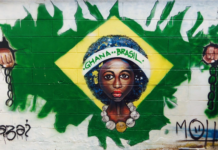The first transnational literary movement in Africa was that of Negritude, which emerged in the 1930s and is most closely associated with the Senegalese poet-president Leopold Sedar Senghor. Bringing together writers from Francophone sub-Saharan Africa and the French Caribbean, Negritude sought to restore pride in black African culture through a celebration of what is described as its sensual, emotional nature, as opposed to European nationalism. As Frantz Fanon argues in The Wretched of the Earth, Negritude’s decision to embrace African culture was a crucial step in developing a nationalist, anti-colonial consciousness.
Frantz Fanon also argues for a national culture which is framed in three stages. In the first, the native intellectual is under the influence of the coloniser’s culture, and seeks to emulate and assimilate by abandoning his own. The native thus tries to be as white as possible. In the second stage, the native discovers that he can never become truly white, or white enough for the colonial master to treat him as equal, and thus he returns to study his own culture, by romanticising the past and traditions, however, devoid of any critical engagement. In the third stage, the native intellectual is truly anti-colonial, battling colonial domination, accompanied by a careful analysis of his own culture to abandon those elements that are oppressive, so that a new future is made possible.
A key element in the process of celebrating African culture was the literary adaptation of tales from oral tradition. In Anglophone Africa, the most startling example of oral narrative style is
Amos Tutuola‘s
The Palm Wine Drinkard( 1952). Francophone African writing of the 1950s and 1960s produced much autobiographical fiction.
Chinua Achebe‘s Things Fall Apart includes an Anglophone perspective of colonial education. Achebe highlights the ambiguities produced by the colonial encounter, but there was also a very strong vein of anti-colonial nationalist writing, especially in French whose primary concern was to imagine a new nation that might replace the old colonial order. The Postcolonial stage saw satire, ambiguity and
hybridity become the dominant motifs of much African fiction from the 1970 onwards. There was also a pronounced move away from realist narratives to more fragmentary and experimental styles. The ethnic tensions, widespread poverty and oppressive regimes in many emerging African nations, as well as the continuing dependence on Europe, led many writers to question the whole nationalist project in their writing.
While the second generation African writers include Niyi Osundare, Festus lyayi, Odia Ofeimun, Femi Osofisan, Zaynab Alkali, Osonye Tess Onwueme and Bode Sowande, the third generation writers include Chimamanda Ngozi Adichie, Helon Habila, Safi Atta, Chris Abani and others.








